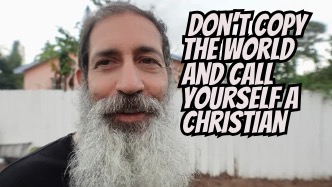Tag Archives: Blessings vs. Curses
Preaching The Gospel At Pride Parade! (Response Video)
Preaching The Gospel At Pride Parade! (Response Video)
There’s never, ever, ever a reason to be emotional.(Response Video)
Should Gentiles Follow The Commandments Of The Bible
Should Gentiles Follow The Commandments Of The Bible
Do not follow the customs of this world
And so, dear brothers and sisters, I plead with you to give your bodies to Yah because of all he has done for you. Let them be a living and pleasing sacrifice, the kind He will find acceptable. This is truly the way to worship Him. Don’t copy the behavior and customs of this world, but let Yah transform you into a new person by changing the way you think. Then you will learn to know Yah’s will for you, which is good, pleasing, and perfect. -Romans 12:1-2
How To Have Joy and Peace and Never Get Angry
How To Have Joy and Peace and Never Get Angry
You Must Destroy The Root of Anger. It’s Spiritual Warfare!
We are under no obligation to accept or obey every thought that enters our minds. We need to capture those thoughts and have self-control of how we use them. The mature believer knows that every thought is not necessarily for our Godly edification.
Don’t Live Like The World But Doing Things In Jesus Name
Don’t Live Like The World But Doing Things In Jesus Name
Torah Reading GENESIS 28:10-32:3
| GENESIS 28:10-32:3 |










